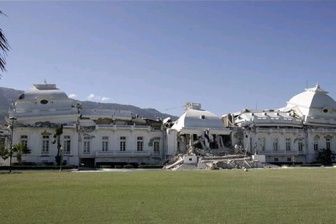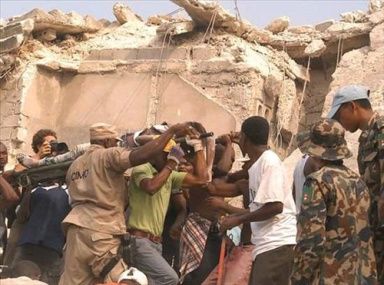Michel Collins
The appointment of former presidents Bill Clinton and George W. Bush as key players in Haitian relief should cause the people of Haiti grave concern, if they weren't otherwise preoccupied with survival. These former presidents' records as pro-life advocates on the international scene is tarnished by real world outcomes.
During his eight years as president, Clinton was responsible for sanctions on Iraq that resulted in the deaths of 170,000 children under five. Former President George W. Bush exceeded that death toll by invading Iraq. That caused civil chaos and conflict among Iraqis leading to the deaths of over one million citizens in that tragic nation. When you see these two coming, their record speaks for itself. (Image)
What will happen in Haiti? What can the citizens of that nation expect? It's instructive to look at the post Katrina rescue effort with a focus on New Orleans as a prototype.
"The Cleansing of New Orleans"
In the aftermath of Hurricane Katrina, more than 200,000 citizens of New Orleans were transported to cities around the United States. Houston and Atlanta were major centers for congregating survivors. Shortly after the involuntary exodus, 43% wanted to return to New Orleans, and 44% wanted to stay in their new homes, and 12% were unsure of their choice.
Little did Katrina's survivors know that they would never have a choice. The state of Louisiana sent a message right away. Procedures were established to make sure that none of the refugees would be able to vote by absentee ballot unless they first returned home and voted in person. Of course, most lacked the resources to do that. Through a variety techniques and excuses, the survivors were turned into permanent non residents of their former home, without regard to their preference. The politics of relocation has whited out the city's former political make up.
The combined class and ethnic cleansing has continued in New Orleans. The evidence is the eviction of poor people from structures not harmed by the hurricane, and the re-zoning of areas where survivors could return into enclaves for the wealthy. It's called progress.
Haiti's Opportunities for Progress
Haiti is not New Orleans but give the financial elite some time. They're just warming up. This is, after all, their first captive nation due to natural calamity. They didn't have to fire a shot. The people are starving, unarmed, traumatized, and incapable of resistance. All this can be theirs!
There are some similarities to the post Katrina operation. Like New Orleanians, Haitians went without food and water for days. When supplies arrived, the effort was handled by military organizers.
The corporate media portrayed the starving citizens of New Orleans as looters as they foraged for anything to keep them alive. Haiti was no different. There was looting, we were told, without the post-script that people were literally starving and thirsting to death. Apparently, the security forces failed to debrief first-hand observers on the ground who reported no such lawlessness. Domestic and foreign oligarchs are the real looters of Haiti. They started well before the earthquake.
While the military secured the scene for relief, food, water, and medical care waited in line\. The several days of delay created a fatigue and physical debilitation among citizens. It worked to make whatever security might have been needed much easier. A weakened population can be contained efficiently, with minimal force.
The most important similarities between New Orleans and Haiti are ethnicity and class based. In New Orleans, the majority of damage occurred in black, largely poor districts of the city. In Haiti, the entire nation is both black and, for the most part, living in poverty.
But the Haiti's divergence from the New Orleans story line is significant. It represents an entire nation, a huge, strategically placed land mass just waiting for the type of rehabilitation that New Orleans only dreamed about. And to the rescuers must have big plans.
Image(Note: You can view every article as one long page if you sign up as an Advocate Member, or higher).






